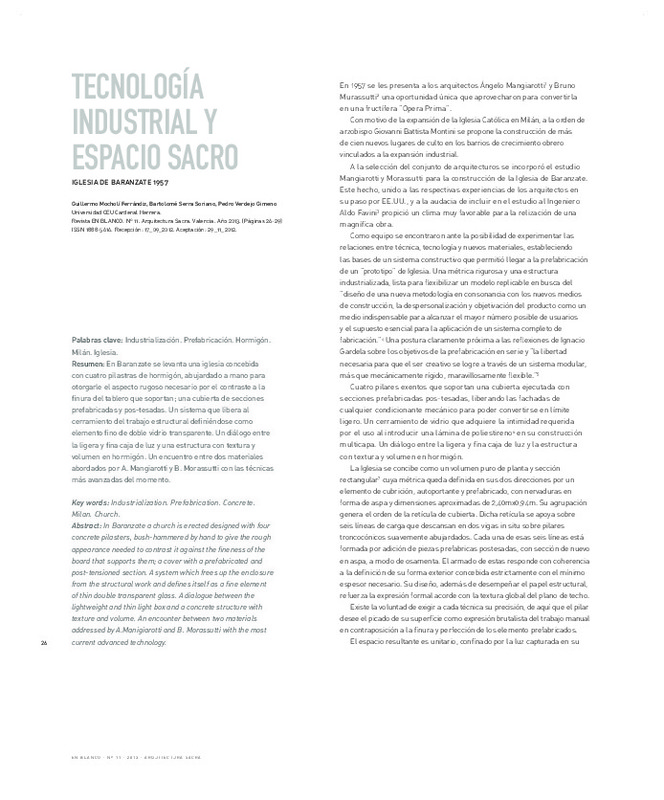JavaScript is disabled for your browser. Some features of this site may not work without it.
Buscar en RiuNet
Listar
Mi cuenta
Estadísticas
Ayuda RiuNet
Admin. UPV
Tecnología industrial y espacio sacro. Iglesia de Baranzate 1957
Mostrar el registro sencillo del ítem
Ficheros en el ítem
| dc.contributor.author | Mocholí Ferrándiz, Guillermo
|
es_ES |
| dc.contributor.author | Serra Soriano, Bartolomé
|
es_ES |
| dc.contributor.author | Verdejo Gimeno, Pedro
|
es_ES |
| dc.date.accessioned | 2018-01-08T13:01:01Z | |
| dc.date.available | 2018-01-08T13:01:01Z | |
| dc.date.issued | 2013-04-18 | |
| dc.identifier.issn | 1888-5616 | |
| dc.identifier.uri | http://hdl.handle.net/10251/94093 | |
| dc.description.abstract | [EN] In Baranzate a church is erected designed with four concrete pilasters, bush-hammered by hand to give the rough appearance needed to contrast it against the fi neness of the board that supports them; a cover with a prefabricated and post-tensioned section. A system which frees up the enclosure from the structural work and defi nes itself as a fi ne element of thin double transparent glass. A dialogue between the lightweight and thin light box and a concrete structure with texture and volume. An encounter between two materials addressed by A.Manigiarotti and B. Morassutti with the most current advanced technology. | es_ES |
| dc.description.abstract | [ES] En Baranzate se levanta una iglesia concebida con cuatro pilastras de hormigón, abujardado a mano para otorgarle el aspecto rugoso necesario por el contraste a la fi nura del tablero que soportan; una cubierta de secciones prefabricadas y pos-tesadas. Un sistema que libera al cerramiento del trabajo estructural defi niéndose como elemento fi no de doble vidrio transparente. Un diálogo entre la ligera y fi na caja de luz y una estructura con textura y volumen en hormigón. Un encuentro entre dos materiales abordados por A. Mangiarotti y B. Morassutti con las técnicas más avanzadas del momento. | es_ES |
| dc.language | Español | es_ES |
| dc.publisher | Universitat Politècnica de València | |
| dc.relation.ispartof | EN BLANCO. Revista de Arquitectura | |
| dc.rights | Reconocimiento - No comercial (by-nc) | es_ES |
| dc.subject | Industrialización | es_ES |
| dc.subject | Prefabricación | es_ES |
| dc.subject | Hormigón | es_ES |
| dc.subject | Milán | es_ES |
| dc.subject | Iglesia | es_ES |
| dc.subject | Industrialization | es_ES |
| dc.subject | Prefabrication | es_ES |
| dc.subject | Concrete | es_ES |
| dc.subject | Milan | es_ES |
| dc.subject | Church | es_ES |
| dc.title | Tecnología industrial y espacio sacro. Iglesia de Baranzate 1957 | es_ES |
| dc.type | Artículo | es_ES |
| dc.date.updated | 2018-01-08T12:12:14Z | |
| dc.identifier.doi | 10.4995/eb.2013.6625 | |
| dc.rights.accessRights | Abierto | es_ES |
| dc.contributor.affiliation | Universitat Politècnica de València. Departamento de Expresión Gráfica Arquitectónica - Departament d'Expressió Gràfica Arquitectònica | es_ES |
| dc.contributor.affiliation | Universitat Politècnica de València. Escuela Técnica Superior de Arquitectura - Escola Tècnica Superior d'Arquitectura | es_ES |
| dc.description.bibliographicCitation | Mocholí Ferrándiz, G.; Serra Soriano, B.; Verdejo Gimeno, P. (2013). Tecnología industrial y espacio sacro. Iglesia de Baranzate 1957. EN BLANCO. Revista de Arquitectura. 5(11):26-29. https://doi.org/10.4995/eb.2013.6625 | es_ES |
| dc.description.accrualMethod | SWORD | es_ES |
| dc.relation.publisherversion | https://doi.org/10.4995/eb.2013.6625 | es_ES |
| dc.description.upvformatpinicio | 26 | es_ES |
| dc.description.upvformatpfin | 29 | es_ES |
| dc.type.version | info:eu-repo/semantics/publishedVersion | es_ES |
| dc.description.volume | 5 | |
| dc.description.issue | 11 | |
| dc.identifier.eissn | 2445-1215 |








